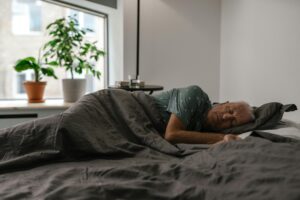💤 The Science Behind a Good Night’s Sleep
Meta Description (SEO):
Discover what really happens when you sleep, why it’s essential for your body and mind, and the science-backed habits that can help you fall asleep faster and wake up refreshed.
🧠 Introduction: Why Sleep Is the Foundation of Health
Sleep is one of the most powerful yet underrated aspects of human health. While diet and exercise often get the spotlight, quality sleep is the cornerstone of mental clarity, physical recovery, emotional balance, and longevity.
When we sleep, our brains aren’t just “shutting off.” They’re working on memory storage, tissue repair, hormone production, and even toxin removal. In fact, sleep affects nearly every system in your body, from your immune response to your metabolism.
Unfortunately, more than 35% of adults worldwide don’t get enough sleep — and the consequences go far beyond feeling tired.
💤 What Happens When You Sleep?
To understand the science of a good night’s sleep, let’s look at what actually happens during the night.
Your body moves through four main sleep stages, which repeat several times in a cycle lasting roughly 90 minutes each.
1. Stage 1: Light Sleep (Transition Phase)
This is the bridge between wakefulness and sleep. Your heartbeat, eye movement, and breathing slow down. It lasts only a few minutes.
2. Stage 2: Deeper Light Sleep
Your body temperature drops and muscles relax. Brain waves begin to slow down, but short bursts of activity called sleep spindles help block out external noise and support memory.
3. Stage 3: Deep Sleep (Slow-Wave Sleep)
This is the most restorative part of sleep. Your body releases growth hormones, repairs tissues, and strengthens your immune system. This stage is vital for physical recovery.
4. Stage 4: REM Sleep (Rapid Eye Movement)
During REM sleep, your brain becomes highly active, and most dreaming occurs here. It’s crucial for cognitive functions like learning, creativity, and emotional processing.

Each cycle repeats 4–6 times per night. Missing or interrupting these cycles can leave you groggy, forgetful, and less productive — even if you sleep for many hours.
🧬 The Biological Clock: How Your Circadian Rhythm Works
Your sleep patterns are governed by your circadian rhythm, a 24-hour internal clock that tells your body when to be awake and when to rest.
This rhythm is influenced by light exposure. When the sun rises, your brain releases cortisol, a hormone that helps you feel alert. As night falls, your brain secretes melatonin, which signals your body that it’s time to sleep.
However, modern life often confuses this natural rhythm.
Blue light from screens suppresses melatonin.
Late-night work or caffeine delays your sleep onset.
Irregular sleep schedules confuse your internal clock.
Maintaining a consistent bedtime and limiting screen exposure before bed are simple ways to restore balance to your circadian rhythm.

🧠 The Brain During Sleep: What Scientists Have Discovered
Sleep plays an enormous role in brain health. During the night, your brain literally cleans itself. A system called the glymphatic system flushes out waste products that accumulate during the day — including beta-amyloid, a protein linked to Alzheimer’s disease.
In addition:
Memories are consolidated. The brain organizes and stores new information from the day.
Emotional balance is restored. Lack of REM sleep increases irritability and anxiety.
Creativity improves. Dreaming and REM activity strengthen problem-solving skills and imagination.
When you don’t sleep well, concentration, learning, and emotional regulation all suffer.
💓 The Body During Sleep: Physical Restoration
While your mind rests, your body works hard to heal itself.
Muscles repair and grow — especially during deep sleep.
The immune system strengthens, producing proteins that fight infection.
Heart rate and blood pressure drop, giving your cardiovascular system a break.
Metabolism balances, regulating hunger hormones like leptin and ghrelin.
Chronic sleep deprivation, on the other hand, is linked to weight gain, high blood pressure, and a weakened immune system.

⚠️ The Dangers of Poor Sleep
A single night of poor sleep can affect your mood, attention, and reaction time. But chronic sleep deprivation leads to more serious issues such as:
Increased risk of diabetes and obesity
Higher chance of heart disease and stroke
Impaired cognitive performance and memory
Depression, anxiety, and burnout
Reduced lifespan
According to the CDC, adults who regularly sleep fewer than seven hours are significantly more likely to develop chronic health conditions.
☕ Common Sleep Disruptors You Might Not Notice
Sometimes, small daily habits can quietly destroy your sleep quality.
Here are some common culprits:
Too much caffeine (especially after 2 p.m.)
Using screens before bed (blue light blocks melatonin)
Irregular sleep times (confuses your body clock)
Heavy meals before sleeping (digestion keeps you awake)
Alcohol consumption (it helps you fall asleep but disrupts REM)
High stress or anxiety (increases cortisol levels)
Uncomfortable bedroom conditions (noise, heat, clutter, or light)
🌿 How to Improve Sleep Quality: 10 Proven Tips
Good sleep isn’t luck — it’s a routine. Here are science-backed strategies that actually work:
Stick to a sleep schedule. Go to bed and wake up at the same time every day, even on weekends.
Limit blue light exposure. Turn off devices or use night mode an hour before bed.
Create a relaxing bedtime routine. Try reading, meditation, or gentle stretching.
Optimize your environment. Keep your bedroom cool, dark, and quiet.
Watch what you eat and drink. Avoid caffeine, alcohol, and large meals late at night.
Exercise regularly. Physical activity improves deep sleep but avoid workouts close to bedtime.
Manage stress. Mindfulness or journaling can calm your mind before bed.
Get sunlight during the day. Natural light exposure helps regulate your circadian rhythm.
Use your bed only for sleep. Avoid working or watching TV in bed.
If you can’t sleep — get up. Do something relaxing until you feel tired again.
Following these habits can transform your nights from restless to restorative within weeks.
📱 The Modern Sleep Crisis: Technology’s Impact
In the digital age, many people suffer from what experts call “sleep procrastination” — delaying bedtime to scroll social media or watch videos.
Research shows that exposure to phone or computer screens before bed can delay melatonin release by up to 90 minutes. The result? You fall asleep later and wake up tired.
To counter this:
Turn on blue light filters or “night shift” mode.
Set a digital curfew — no screens 1 hour before bed.
Replace screen time with relaxing activities like journaling or reading.
🕰️ How Much Sleep Do You Really Need?
The amount of sleep varies by age and lifestyle:
Age Group Recommended Hours per Night
Children (6–13 years) 9–11 hours
Teens (14–17 years) 8–10 hours
Adults (18–64 years) 7–9 hours
Older Adults (65+) 7–8 hours
Quality matters just as much as quantity — six hours of deep, uninterrupted sleep can be better than eight hours of restless tossing and turning.
🌅 The Benefits of Getting Enough Sleep
A consistent sleep schedule can transform your health:
Sharper focus and creativity
Stronger immune system
Healthier metabolism
Better emotional regulation
Reduced stress levels
Slower aging and improved skin appearance
When you prioritize sleep, every other area of your life — from relationships to work performance — improves.
💬 Frequently Asked Questions (FAQ)
1. Is it true that sleeping too much can be bad for you?
Yes. Regularly sleeping more than 10 hours per night can sometimes indicate underlying health issues like depression, thyroid problems, or chronic fatigue syndrome.
2. How long before bed should I stop drinking coffee?
Ideally, stop caffeine intake at least 6 hours before sleeping, as it can stay in your system for half a day.
3. What’s the best time to go to sleep?
Experts recommend sleeping between 10 p.m. and midnight, when melatonin levels are naturally high and your body is primed for deep sleep.
4. Can naps make up for lost sleep?
Short naps (20–30 minutes) can boost alertness, but they don’t fully replace the deep restorative stages of nighttime sleep.
5. Are sleep supplements like melatonin safe?
Melatonin can help with short-term sleep issues, but you should use it carefully and consult a healthcare provider if you rely on it long-term.
🌙 Final Thoughts: Sleep Smarter, Live Better
Sleep is your body’s natural reset button — the most powerful form of recovery available. It’s free, it’s healing, and it determines how you feel, think, and perform every day.
Understanding the science behind a good night’s sleep empowers you to take control of your health from the inside out.
So tonight, put down your phone a bit earlier, dim the lights, and let your body do what it does best — rest, repair, and recharge.
Your future self will thank you.


